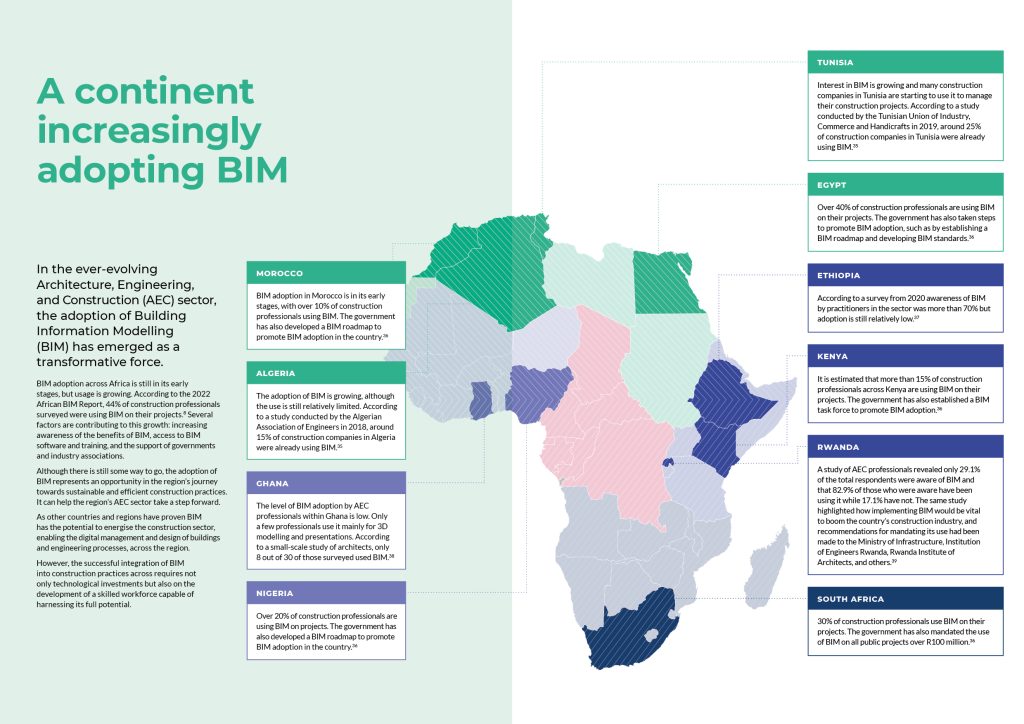Africa is on the cusp of a digital revolution, with the potential to reshape its economic and social landscape. With the focus and investment, the Architecture, Engineering, and Construction (AEC) sector could play a pivotal role in driving sustainable growth across the continent.
With Africa’s population expected to reach 2.4 billion by 2050, the demand for infrastructure, housing, and urban development will be immense. However, to meet these demands and unlock the full potential of the sector, players across the sector must embrace digital technologies and invest in the skills necessary to leverage them.
The business case for digital transformation
For businesses operating in the AEC sector, digital transformation shouldn’t just be a buzzword—it needs to become the path to maintaining competitiveness and achieving long-term success.
The adoption of digital technologies like Building Information Modelling (BIM) can revolutionise the way projects are designed, managed and executed – thereby leading to significant improvements in efficiency, safety, and sustainability. BIM offers a comprehensive approach to project management, allowing for better collaboration, reduced errors and more informed decision-making throughout the construction lifecycle.
The benefits of digital transformation extend beyond operational efficiency. By leading the way in digital adoption, businesses can enhance their reputation, attract top talent, and differentiate themselves in a crowded market. The integration of digital tools and technologies can also open new avenues for innovation, enabling businesses to explore sustainable building practices, optimise resource use, and contribute to the broader goals of economic and environmental sustainability.

The imperative for skills development
The successful adoption of digital technologies hinges on the availability of a skilled workforce capable of navigating this new landscape. For businesses, investing in the continuous training and upskilling of their workforce is no longer optional—it is essential. Employees equipped with the right digital skills can unlock the full potential of BIM and other technologies, driving productivity and innovation.
It is incumbent on businesses to take a proactive approach to skills development by allocating resources to training programmes that cover the latest tools, software and best practices in the industry. They should look to invest in technical training and also a culture of continuous learning and adaptation.
Opening doors to the next generation
Businesses have a crucial role to play in nurturing the next generation of talent. Africa’s youthful population represents a vast pool of untapped potential, and the AEC sector can be a major driver of job creation and economic growth. But here’s a challenge. For young people to thrive in this sector, they need exposure to real-world experiences and opportunities to develop relevant skills.
Employers can make a significant impact by offering internships, apprenticeships and work experience programmes which provide young people with hands-on experience in the industry. These initiatives not only help bridge the skills gap but also create a pipeline of future professionals who are well-versed in the latest technologies and practices. By actively engaging with educational institutions and signposting career opportunities, businesses can inspire young people to pursue careers in the AEC sector. This should help to ensure a steady flow of talent to support the industry’s growth.


Taking charge of your digital future
While businesses have a responsibility to foster skill development, individuals can take ownership of their career trajectories in this rapidly changing landscape. The AEC sector is becoming increasingly competitive, and those who can demonstrate proficiency in digital tools and technologies will have a distinct advantage in the job market.
Seek out opportunities to enhance digital skills, whether through formal education, online courses, or on-the-job training. Acquiring industry-recognised certifications can further validate expertise and open doors to new career opportunities. By staying ahead of industry trends and continuously updating skills, individuals can position themselves as valuable assets in the digital transformation of the AEC sector.
All of this is not just about professional advancement—it’s about contributing to the broader goal of building a sustainable and resilient future for the continent. As digital ambassadors, they can advocate for the adoption of innovative solutions that enhance project outcomes, reduce environmental impact, and improve the quality of life for communities across the continent.
A collective responsibility
The digital transformation of Africa’s AEC sector is a shared responsibility. Collaboration will drive the adoption of digital technologies, foster the development of essential skills, and unlock the full potential of the sector to contribute to Africa’s growth.
The blueprint is ready—now it’s time to build.
Tomas Karlsson is the sr. manager of channel services at KnowledgePoint. This means he oversees the management of outsourced extended enterprise learning programmes, recruiting and supporting global network of training providers on behalf of organisations, including Autodesk.
Drawing on exemplars from Autodesk Learning Partners, our insight report “Constructing Skills for African Prosperity” is part Autodesk’s commitment to education. In this report we explore some of the unique challenges and opportunities affecting the region. We consider factors impacting the rate of change and adoption of technologies in the sector. Drawing on industry exemplars, we offer practical solutions and suggest actions for players across the AEC ecosystem.
For more information about the report and Autodesk’s commitment to education: https://knowledgepoint.com/autodesk/constructing-skills-for-african-prosperity/
